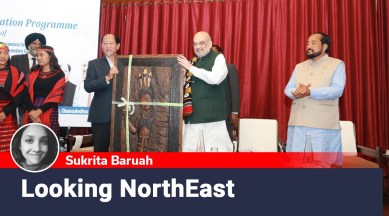Nagaland BJP problem of plenty as pact seen as leaving few tickets to go around, sets off protests
Many leaders from different parties have joined the BJP since 2018, including sitting MLAs; want the formula with ally NDPP changed from 20:40 to 30:30

Too many aspirants but too few tickets to accommodate them — this seems to be the BJP’s problem ahead of the Assembly elections in Nagaland on February 27.
With leaders from different parties making a beeline for it over the years, the BJP in the state is bubbling over with party workers and aspiring candidates. A large number of them have hit the streets now against the party’s 40:20 seat sharing formula with the Nationalist Democratic Progressive Party (NDPP).
The BJP had arrived at the ratio with the NDPP ahead of the 2018 Assembly elections. The NDPP had then gone on to win 17 of the 40 seats it contested, and the BJP got 12 out of its 20 seats.
In 2022, the two parties had announced that the formula would continue in the 2023 polls too – a decision that was reiterated by their leaderships this month.
However, as the dates for filing the nominations draw closer, the members of the expanded BJP ranks in the state are revolting against the formula. They are claiming that it does not fulfil the aspirations of party workers and those who have joined it in recent years.
In 2018, the BJP had increased its footprint in the state considerably, from just one seat in 2013 to 12. Its total vote share had seen a rise from 1.75 per cent to 15.31 per cent.
It were these rising fortunes of the party that had drawn ticket aspirants to the party, including many MLAs, who are apprehensive that they won’t be accommodated in the seat-sharing arrangement.
This week, BJP leaders held protests in several districts – such as Kohima, Dimapur, Mokokchung, Shamator, Zunheboto – and demanded that the arrangement be modified to 30 seats each for the BJP and NDPP. They also asked for tickets for BJP candidates from their constituencies.
Protesting at the BJP head office, the Kohima district unit demanded a ticket for former Southern Angami-II MLA Kropol Vitsu. An MLA from the Naga People’s Front (NGF) in 2013-18, he is now in the BJP.
Vitsu told The Indian Express: “The state BJP workers had expected that the seat-sharing ratio would be modified to at least 30:30 based on the party’s performance in the 2018 polls. Last time, the BJP had won 12 of 20 seats, which is 60 per cent strike rate. It should not remain there, it should go higher.”
He added, “The BJP was not very popular in Nagaland, but after seeing the development through the policies of Prime Minister Narendra Modi as well as the ground realities of the implementation of various programmes, people have changed their mindset. They have seen that politics and religion are two different things. Many are open to the BJP. This is why people are saying that 20 seats are not enough. The number should either be enhanced or the BJP should go solo.”
Expressing dissatisfaction with the state BJP leadership, Vitsu said, “I cannot presume what central authorities are thinking about Nagaland, but it feels somebody has misinterpreted the interest of party workers. Many workers are frustrated because they had done a lot of ground-level work. There is a likelihood of that frustration turning into action against authority.”
The latest prominent entrant to the Nagaland BJP is former minister and four-time Koridang constituency MLA Imkong Imchen, who resigned from the NDPP last week. Calling for a 30:30 arrangement, Imchen said: “It is a demand of the people. I believe there’s a strong possibility that the BJP will form a single-party government.” He added that he joined the party because “Prime Minister Modi will help him serve people better” and was impressed with its “working style”.
However, that a ticket was a big driving factor was admitted by Naiba Konyak, one of the 10 aspiring BJP candidates who held a protest in Dimapur on Monday. Of the 10, eight had contested in 2018 polls (three on NPF tickets, two from NDPP, one from NPP ticket, and two as Independents).
Konyak, a former MLA who contested from Tobu as part of the NPF in 2018, said that 2018 was different as not many wanted to align witht the BJP. “But this year, there are all these aspiring candidates. We were in different parties, but from 2018 onwards, we have been invited to join the BJP. We came and we have been working hard so that we would get tickets. We are all candidates with a 100 per cent chance of being elected but they do not want to give us tickets.”
However, the chances of the seat-sharing arrangement being revised this close to the elections is slim, sources in the BJP admitted. “That the 40:20 formula will remain was actually a proposal from the BJP in Delhi. It has been a winning formula and is a policy of ensuring that all major voices and strong leadership are taken on board while working towards a solution to the Naga issue. A state leader had voiced support for 30:30 but it had been shot down by the Centre,” a senior BJP Nagaland leader said.